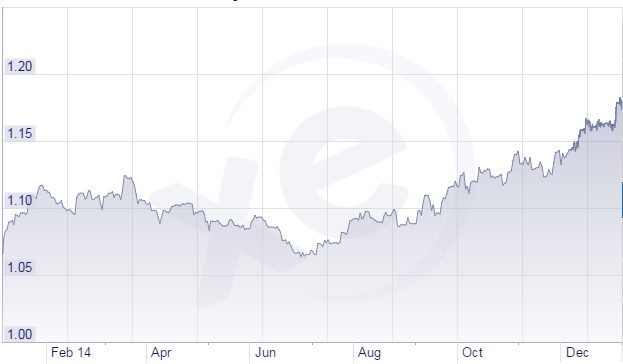Monday’s blog was about predictions of sorts, or rather what the general sentiments are for the Toronto real estate market in 2015.
Today, I want to do something far more productive, since “predictions” are often “wild speculation,” and instead I want to look at factors currently affecting the real estate market, and trends to watch for as we move throughout the year.
Some of these factors were duly noted by the readers and commenters in Monday’s blog, but what can I say – they often beat me to it!

Some of these items will truly affect whether or not the real estate market goes up or down, and some are loosely related.
But all are points to discuss, even though some (as we’ll see with #1…) are more important than others.
1) Interest Rates
This was touched upon multiple times in the comments section of Monday’s blog, and through Monday and Tuesday, I’ve talked about interest rates to close to ten clients on the phone.
People ask me, “Do you expect interest rates to go up?”
My response is always the same, “Well, I certainly don’t expect them to go down.”
Now it’s worth mentioning that just as market bears have been saying “The market has peaked” for the better part of a decade, as the market continues to rise, we’ve also heard people (myself included…) say at many points about interest rates, “They can’t get any lower.”
When rates broke south of 4.0%, I certainly though we’d never see them lower.
But really, truly, this time (like a child saying “I’ll never do it again”), I can’t see them going lower. That’s what I told a client on the phone today, when I said that a 2.89% mortgage can’t go to 2.49%. It just can’t…
In fact, I think we’re all on the other side of the coin, in that we expect interest rates to rise this year.
Whether it’s the Bank of Canada hinting at a rate raise, or economists and mortgage brokers telling us to prepare, I think we all know it’s coming. It’s more a question of how much, and when.
Frankly, I think we’ll see rates rise by no more than 25-basis points, and I think we’ll see it in October.
Then again, Stephen Poloz hinted back in July that we might not see interest rates rise for another 18 months! Remember THIS article, and many others like it, when he suggested that Canada will enact an “interest neutral” policy.
We also have to consider what the U.S. Federal Reserve does with their interest rate policy, since Canada has always been closely tied to the U.S.
The Federal reserve has held its rate at just over ZERO for six straight years!
As the Globe & Mail weekend cover story, “2015: Six Stories To Watch In The Year Ahead,” explains, the S&P 500 has risen 200% from its lows, and as the U.S. economy improves, higher interest rates are more than likely.
Is it possible that the Federal Reserve will raise its rates, and the Bank of Canada will do nothing in response?
And to the point of many of Monday’s blog readers: What would happen if rates DID rise?
Let’s assume that rates rise 25-basis points, or a 5-year, fixed rate mortgage rises from 2.89% to 3.14%.
Assuming a 10% down payment, here are how the monthly payments would change for a few selected price points:
$300,000 property: $1,280.57 to $1,315.24 – an increase of $34.67
$500,000 property: $2,134.29 to $2,192.06 – an increase of $57.77
$750,000 property: $3,201.43 to $3,288.09 – an increase of $86.86
And just to see what it’s like on the upper end, let’s consider properties over $1 Million, where a 20% down payment is mandatory.
Let’s see how it looks, with, say, a 30% down payment:
$1,500,000 property: $4,910.00 to $5,044.81 – an increase of $134.81
Can you REALLY suggest that $34.67 per month is going to affect the bottom line of an entry-level condo buyer? Because I know for certain that a $1.5M house buyer couldn’t care less about $134.81. Nobody at that level is going to change his or her life plans for what amounts to a cell phone bill.
25-basis points? Let’s do it.
50-basis points? It won’t happen, but if it did, I think the market would be more than ready.
2) Land Transfer Tax
For some reason, I feel like this subject will get a lot less attention this year!
It was really a Rob Ford story, and eventually a Doug Ford story.
I hate the Toronto LTT, not because I’m a real estate agent, but because I think it’s arbitrary and punitive.
A friend of mine is currently in the process of buying a house in Israel for investment, and believe me when I say that everything works differently over there. The tenant pays property tax, maintenance, utilities, etc.
But what’s even more interesting is the closing cost situation, which is estimated to be 2% for everything. That’s commissions, legal fees, and taxes. Break it down, and you’re paying close to NOTHING for taxes, and there is no such thing as “land transfer tax.”
Of course, you don’t need to go all the way to Israel to find a place with low closing costs.
In fact, you can find one right here in our very own backyard.
Perhaps you’d be shocked to find out that despite the booming economy, rising real estate prices, and all that oil money, the Province of Alberta does NOT have land transfer tax.
They must laugh at us when we tell them that on the purchase of a $1,000,000 home, that we have saved all our lives for, we pay $16,475 to the Ontario government, and $15,725 to City Hall.
It’s absurd.
And you might argue that the $16,475 we paid to the Province of Ontario was absurd, before David Miller brought in the Municipal version of the tax.
Now having said all of this, do we really expect the tax to be repealed, or reduced?
On January 1st, 1991, Brian Mulroney introduced G.S.T. to Canada, and Jean Chretien and the Liberal party won election in 1993 by promising to repeal the tax.
That never happened, and never really came close.
Sure, the tax was reduced from 7% to 5% in 2008, but then we ended up with H.S.T. of 13% in the end, and we probably pay more in tax than we did when we had 7% GST and 8% PST on varying items.
My point?
I don’t believe that politicians repeal taxes. They may alter them, re-name them, or restructure them, but they don’t eliminate them.
Rob Ford promised in 2010 to completely eliminate the tax. He did not.
Doug Ford promised in 2014 to reduce the tax by 15%, four times, for a total of a 60% reduction. He did not.
John Tory likely won’t touch this subject, and I don’t know how much pressure he’ll feel, compared to the Fords, who won voters with their pledges.
But the truth is, as punitive as the tax is, I honestly can’t point to a single buyer who told me, “I would buy, if not for that damn double land transfer tax.”
We might see more people trying to flip houses and condos if the taxes were lowered, however. If you wanted to buy a $300,000 condo to renovate and flip, you’d pay $5,725 in LTT, but without the Municipal portion, you’d only pay $2,975. Does that $2,725 savings make or break your return? No, but it would help. And on larger properties – say a $700,000 house you want to add 10% to, and flip, you’d be saving just shy of $10K if the tax was eliminated.
Hot topic? Perhaps.
But I don’t see this having a major affect on the Toronto real estate market in 2015, either way.
3) Canadian Dollar
Depending on your outlook, the weakening Canadian dollar could be good, or bad, for the real estate market.
Some people might argue that for Canadians, it means their money doesn’t go as far when they travel, and thus more discretionary spending equals less savings, and less money to purchase real estate.
Well, that’s for Canadians.
But as we know, a LOT of the real estate purchased in Toronto is by non-residents.
Here is a graph of the Canadian dollar versus the US dollar in the past year, and I’m choosing the inverse rather than the straight conversion because I want to show how much further the American dollar goes:

I know, it’s not pretty.
The U.S. dollar opened 2014 at approximately $1.06 CDN, and closed around $1.18.
So just think about how much cheaper it is for non-residents to purchase Canadian real estate.
I have a client who has been working in a major Canadian city for the past five years. He’s one of the first clients I ever had back in 2003-2004, and I sold him his first condo, and then sold it for him when he moved down south.
About 18 months ago, he told me his work “might” be relocating him back to Toronto. And for anybody who has had friends or family relocated (specifically if you’re an executive), you know that from when your work first tells you you “might” be moving to when you actually do move, can take literally, several years.
He was looking at houses in the $1,500,000 range, and with the market as strong as it’s been, he feared that he might eventually get priced out.
So let’s say that the $1,500,000 house, on January 1st, 2014, with the USD at $1.06 CDN, would have cost him $1,415,094 in his own currency.
With the market going up 8.5% last year, I have to think that the $1.5M segment might have added 4-5%, but let’s go with the latter just in case. So say that $1,500,000 house costs $1,575,000 today.
With the U.S. dollar now at $1.18 CDN, that $1,575,000 house only costs him $1,334,745.
Even with the appreciation in the Toronto housing market, the house costs $80,000 less than it did one year ago, in U.S. dollars.
Any non-resident of Canada, whose currency has appreciated against the Canadian Dollar in the past year (and let’s face it – the USD is the world’s currency), now finds Canadian real estate more affordable.
Okay, this is becoming very long, very quickly!
Rather than cut down those points above (and you all know that brevity is not my strong suit…), I think I’ll pick up the other items on Friday.
These are probably the larger three discussion points (although we have to touch on pre-construction condos too…), so Friday’s blog will have some more factors affecting the real estate market to examine, just in smaller doses.
Until then…































Appraiser
at 8:35 am
CBC changes it’s tune regarding interest rates from yesterday. Bottom line is that interest rates normally rise to meet inflation – but inflation ain’t ‘gonna happen:
http://www.cbc.ca/news/business/interest-rate-hike-why-the-bank-of-canada-may-hold-off-1.2891304
Martian
at 9:28 am
Rates can always get lower. What is the explanation for why they cannot be 2.5%… or 2.0%… or …? It seems insane but we have been wrong for so, so long that I will never say never.
Interest rates are about perception. Raising them is “rocking the boat,” keeping them steady is status quo, and dropping them is a helping hand. Of course 0.25% on an entry level property doesn’t really make a huge difference month to month, it’s the stories that will go along with the interest rate hike.
In switzerland the bank rate is -0.25% and dropping. Yes you have to pay to keep money in the bank. anything can happen. http://www.nytimes.com/2014/12/19/business/switzerland-central-bank-interest-rate.html?_r=0
Joe Q.
at 10:12 am
I would like to hear from a mortgage broker on this one, but I would imagine that at some point the supply of money that feeds into fixed-rate mortgages will shift elsewhere (other investments will become more attractive).
Martian
at 10:21 am
I’m curious too, someone please tell us! At _some_ level the margins must be too small for it to be attractive but I don’t know how low that is… apparently not 2.89%.
Boris
at 12:06 pm
The reason the Swiss have negative nominal rates is because they are trying to maintain a weak currency amidst the flight to safety due to the events that are occurring in Europe/Russia. Although it has changed significantly, Switzerland has typically been a safe haven for deposits due to theri banking laws and tax status. It has changed somewhat, but is still considered a place of first resort for capital fleeting crisis to find a home. Not just in native currencies, but in Swiss Francs, as people flee Ruble exposure and even Euro exposure in the wake of a potential large round of QE in Europe. The SNB has said they will defend the 1.20 euro/franc level. Why do they want the currency weaker? Because they are attempting to shore up inflation. An overly strong currency hurts major components of their economy.
Negative nominal interest rates are one of the rarest and least used tools in the central bank toolbox. The situation in in Switzerland combined with oil’s collapse, Putin’s game of Risk and a potentially large new debt monetization program by the ECB has created a very unique scenario. The Eurozone central banks do have some of these tools at their disposal as well, but they are last resort kindof mechanisms. The reason it exists for the other central banks would be to force institutions to lend capital as opposed to having it sit at these institutions. But again, this is a massive bazooka they hope they will never have to use. Again, this is not why the Swiss are instituting it, instead they are to manipulate their currency.
None of these scenarios are at all likely for Canada. We don’t have the Swiss financial systems haven status or currency, we aren’t geographically adjacent to the types states they are, we have a real economy that is not based on foreign governments/institutions shelving cash in CAD. There is no reason or impetus for the BoC to want to push CDN banks to stop sitting on cash. It is very clear they want the opposite – the FInance Ministry, BoC and OSFI are very concerned about the health of Canadians’ balance sheets, banks’ balance sheets, pension balance sheets etc. Basically the opposite of what would have to happen. There are many reasons this is very unlikely to change, as I spelled out above.
Hope that helps.
Oh – finally…mortgage rates and overnight rates are VERY different. The -ve rate in switzerland is not a mortgage rate, it is what tier 1 banks are charged to store capital with the SnB. There is always a positive spread from this to the interbank rate (ie LIBOR) and then another positive spread to a retail product like mortgages. Why? Because no one underwrites mortgages to lose money. Its really simple. Plus everything I said above.
Boris
at 12:14 pm
I should add, the fixed rate 4 year rate in Switzerland is about 1.4%
And its unliekly we would ever have rates at zero never mind -0.25.%
Realistically, in a crazy scenario like what is playnig out in Europe, this is the lowest rate possible.
Martian
at 9:21 am
Thanks for the explanation. My point was just that people always say “well interest rates CAN’T be negative.” Well, actually they can… in weird situations. Yes the overnight isn’t the “real” rate but if the overnight were -2%, and the interbank rate 0%, then is a 1.5% mortgage rate impossible?
Obviously negative mortgage rates sounds completely insane – pay people to buy houses? – but I’m of the belief that anything can happen if it’s politically necessary. If the average house price is dropping $10,000 a month right before a federal election, I believe governments could be VERY creative.
I’m not sure I agree with some of the other points. Safe haven status and money flowing in from outside is very much a part of the Canadian economy, especially real estate and especially Toronto condo real estate.
Kyle
at 9:41 am
One of the other factors to look out for in 2015 is the bear buzz word “over-building”. 2014 was supposed to be the year of the epic condo floods. Alas, even with a record number of completions in 2014, the city was not awash in unsold or unrented condos. In fact condo prices rose, rents and vacancy rates remained level. So the reality is even with record completions, supply has still not kept up with demand. With completions expected to be lower and demand expected to be higher (see below for why), the buzz word for 2015 should be “under-building”. Hopefully once these facts sink in, we can stop hearing the word “over-building” thrown around by the inept clowns that earn a paycheck from making bad predictions.
Also another emerging trend is the lack of new purpose built rentals in this city, has been attracting a lot of money from large players. Other than a small handful of projects built by Menkes, new construction has only been in condos and not rental apartments. Toronto real estate as a long term investment is really getting the spotlight abroad, and this will likely accelerate given the exchange rate. These players have only three choices if they want to get in the game: 1. Build new apartments like Menkes has been doing 2. Buy and refurbish the old existing stock of apartments like Akelius has been doing 3. Buy entire pre-con projects and convert them to rentals, like Greenland Developments who bought the entire King Blue project and the Private Equity fund that bought the entire Selby project.
Appraiser
at 11:56 am
@ Kyle, well put! What will the bears think of next?
And just to make it official, here is the latest year-end news release from TREB:
http://www.torontorealestateboard.com/market_news/release_market_updates/news2014/nr_market_watch_1214.htm
Another banner year for sales and prices, just as the bears had predicted. Ho-hum.
Seeya
at 8:43 pm
@appraiser … You are the biggest real estate pumper I’ve seen. Explain how Alberta is going to survive $50 oil and layoffs everywhere. Listing numbers are exploding since December as the bubble pops ….
Please, entertain us some more…..
Ed
at 10:29 am
Re double land transfer tax.
David, as someone who is in the industry do you think that many owners would consider moving decide not to because of all the fees and the double land transfer tax and instead stay in the home and renovate?
David Fleming
at 1:24 pm
@ Ed
You bring up a good point.
This is something that was discussed when the double LTT first came into practice, but I have yet to find a would-be buyer that decided to stay and renovate, rather than buy.
Perhaps it’s due to location (transit, retail, schools), as well as the size/style of the home, more so than the financials involved.
Jonathan
at 1:39 pm
Yeah, it’s not like you can turn a 3 bed, 2 bath starter home into a 4 bed, 4 bath “forever house” through minor renovations!
I wonder if the double LTT has been part of the reason that gut reno houses are now selling for top dollar (relatively speaking) – buying a lower priced house and renovating is a good way to reduce the overall LTT burden.
Craig H.
at 3:10 pm
That is exactly what we did and a good part of it is due to the 9-10% frictional cost for selling an buying a house in Toronto. For the cost of RE commission, double LTT, legal fees, etc, we did a full basement reno (adding a basement and a full bath), re-did the master and kids bathrooms and freshened up the kitchen.
Geoff
at 8:05 pm
WEll there will be exceptions, but to me the biggest barrier to buying a new house is that I’d have to drop $1.5M to get a similar house as I have now in a better area.
I do disagree with David on this, the LTT is the best thing Toronto has done in a long time. I’d much rather an optional tax than a mandatory one, especially if as he admits it basically has no effect on those looking to buy.
jeff316
at 2:53 pm
Bingo.
Kyle
at 2:36 pm
I think the impact is going to depend a lot on each homeowner’s situation and wants. And as Jonathan mentions there is only so much you can change about any given house. To be fair, i’m not sure someone from the real estate industry is the best person to answer that question. I think if someone has decided to renovate instead of buy their first call would be to an Architect or a Contractor, rather than to their Realtor. From what i see in my neighbourhood, people i know are opting to renovate instead of buy, myself included. At some point I want a new kitchen and main floor family room. If i sold my place now and bought a comparable house with a new kitchen and a main floor family room the new house would cost about 250K – 300K more and the round trip transaction costs would be close to $130K. Instead if i renovated, it would only costs me about 250K – 300K and i would be “saving” the $130K. Obviously the Toronto portion of the $130K is only about $28K, but again it is $28K that i would be “saving” by renovating instead of moving.
Jonathan
at 1:37 pm
Don’t forget about the stock market! As we saw in late 2008/2009, overall stock prices have a huge impact on buyer’s willingness to pull the trigger on new purchases.
David Fleming
at 5:06 pm
@ Jonathan
It’s included in Friday’s post!
donny
at 12:22 pm
I agree the LTT is probably here to stay, unfortunately. Do you think it ever possible they shift the Toronto part and let the seller pay?? It would make a lot of sense. Buyer pays province and the seller pays the city.
Long Time Realtor
at 12:22 pm
I’m curious to see what affect the slump in oil prices might have on the Toronto real estate market. If jobs are being lost, especially in Alberta and Newfoundland, where are the displaced workers going to go? There’s a good chance that many will end up in T.O., which will put further demand pressures on the housing market, especially for rentals.
Jensen
at 1:26 pm
That sounds unlikely to me. A few unemployed plumbers that trickle in are not going to prop up prices in Riverdale. The drop in oil prices will have significant effects on prices in AB, and Newfoundland on the downside. I suspect it may also negatively effect the economy of other places such as Nova Scotia in which people work in AB and fly back to live, but who knows how much. Though I do think oil prices is one of the two interesting changes to keep an eye on in 2015 for property prices across Canada. The other being the Federal governments closure of the foreign investor program. But again I think that will have much less impact on prices and perception in T.O. than in somewhere like Vancouver. This is definitely all guesswork though.
Long Time Realtor
at 2:17 pm
Just to be clear, there are a great many well-educated highly-skilled engineers and skilled tradespeople working in the oil patch. Declaring that “a few unemployed plumbers might trickle in” is a tad dismissive.
Jonathan
at 2:56 pm
How many is “a great many”? The GTA has a population of around 6 million so it would take a really big shift to make a dent in the housing market. We don’t really have much need for petroleum engineers or pipe fitters either – I would imagine that relatively few could make an easy transition to working on condo projects.
A more likely outcome is that the fly-in, fly-out workers from Ft. Mac will simply stay home and go on EI until the price of oil rebounds or the EI runs out.
Boris
at 3:39 pm
its pretty much the opposite. Alberta has been hiring up tradespeople from all over Canada, many from the GTA for several years now. It’s possible many of these will return. Many live in Toronto. I know of several.
Seeya
at 8:48 pm
@ long time Realtor….
So you think all those Alberta layoffs are coming to Toronto to work and rent here?
Would love to know who’s going to hire them….
Tell me more…
Long Time Realtor
at 9:59 pm
@ Seeya: There are 100,000 people coming to T.O. each year. Who’s hiring them?
Must be somebody…
Joe Q.
at 4:32 pm
I also posted some thoughts about this today on the new thread, before seeing Long Time Realtor’s comment.
The Alberta and GTA economies are coupled in at least an indirect way, so the low crude-oil prices that lead to unemployment in Alberta will likely also have knock-on effects that reduce the opportunities available here.
Additionally, while I have no doubt that many skilled tradespeople could find good opportunities in the GTA, the same is not really true of professionals such as petroleum engineers and geologists. The job market for those sub-fields here is pretty small.
Rekrul
at 4:57 pm
How about real estate agents fees? Why don’t we talk about it? The standard (yes, I know there are other options) seems stuck at 5%, even though property prices keep rising… isn’t time to lower them a tad? Should it really cost $75K to sell that $1.5MM property?
Long Time Realtor
at 7:52 pm
O.K. let’s talk.
First of all, you don’t have to use a Realtor to sell your home. It is perfectly legal to sell your own home, and there are dozens of web sites and FSBO companies to choose from. After all, house sell themselves, especially in a hot market right??
In addition, there are numerous ‘post-only’ and discount real estate brokerages available.You may have to do much of the work yourself, but some people don’t mind. Many sellers are even quite good at it and have been very successful in selling their homes in this manner.
No one is holding a gun to anyone’s head forcing them to use a full-time, full-service, full-fee brokerage.
Having said that, it is also evident that such agents and brokerages are thriving. It is clear that many clients (not all) prefer their skillful advice, honest counsel and professional marketing abilities. Especially when dealing with their most valuable asset.
Steve
at 10:02 pm
Happy 2015 everyone …. as you will probably agree, we all come here because we are somehow involved with RE. Nobody really wants to admit prices may stagnate or drop. But, as we have seen before, nothing goes up forever, and sometimes “a bird in the hand is worth two in the bush”. So, if you were thinking of selling …….